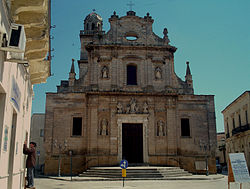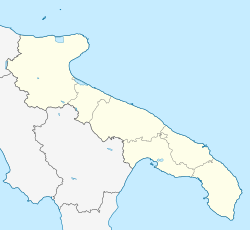Salice Salentino
Salice Salentino | |
|---|---|
| Comune di Salice Salentino | |
 | |
| Coordinates: 40°23′N 17°58′E / 40.383°N 17.967°E | |
| Country | Italy |
| Region | Apulia |
| Province | Lecce (LE) |
| Government | |
| • Mayor | Antonio Rosato |
| Area | |
• Total | 59.87 km2 (23.12 sq mi) |
| Elevation | 49 m (161 ft) |
| Population (30 November 2018)[2] | |
• Total | 8,152 |
| • Density | 140/km2 (350/sq mi) |
| Demonym | Salicesi |
| Time zone | UTC+1 (CET) |
| • Summer (DST) | UTC+2 (CEST) |
| Postal code | 73015 |
| Dialing code | 0832 |
| ISTAT code | 075065 |
| Patron saint | Francis of Assisi |
| Saint day | Second Sunday of October |
| Website | Official website |
Salice Salentino is a small town and comune in the southern part of Apulia, Italy, in the Salento area. It is bounded with the province of Taranto to the northwest and the province of Brindisi to the north.
Main sights include the Chiesa Madre ("Mother Church") of Santa Maria Assunta (16th century) and the convent of the Friars Minor (1597-1597). Its coat of arms features a tree in the middle of a shield and a golden crown on top.
History
[edit]Founded by the prince Raimondo Orsini Del Balzo in the end of the 14th century, Salice Salentino owes its name to the willow trees that once used to grow and populate its muddy, clay soil. The prince constructed his residence, the "Casa del Re" (House of the King). It was later owned by the baron Zurlo in 1485. It was passed on to the marquis Albricci, Enriquez, prince of Squinzano, Filomarini, duke of Cutrofiano and della Torre.
Economy
[edit]Its main economical activity is agriculture in the olive and wine industry.
It is a center of production for Salice Salentino wine.
References
[edit]- ^ "Superficie di Comuni Province e Regioni italiane al 9 ottobre 2011". Italian National Institute of Statistics. Retrieved 16 March 2019.
- ^ Population from ISTAT
External links
[edit]




